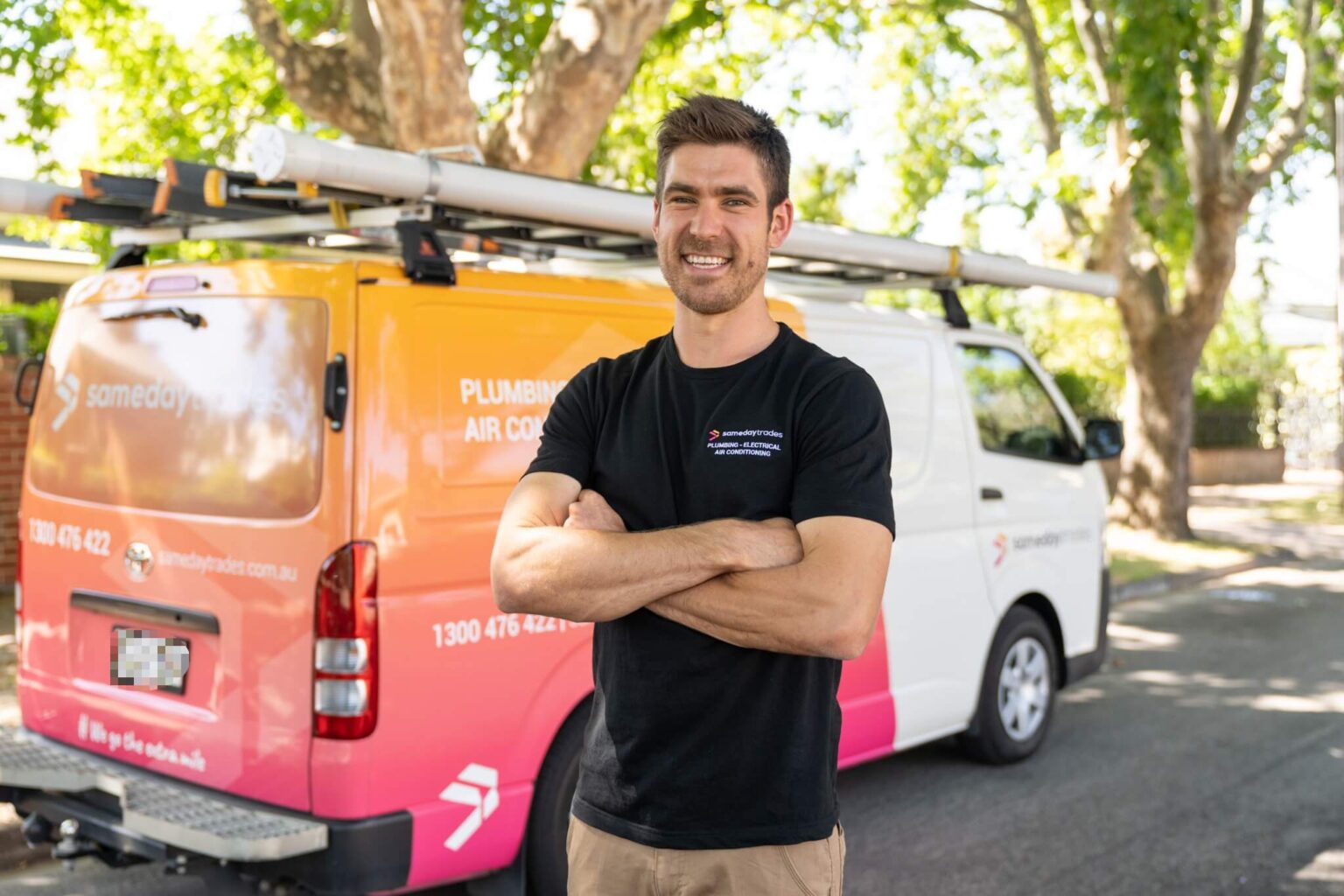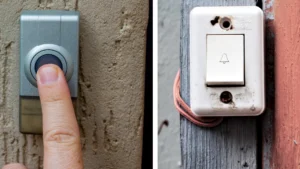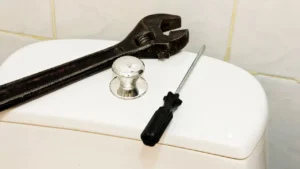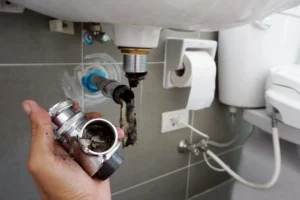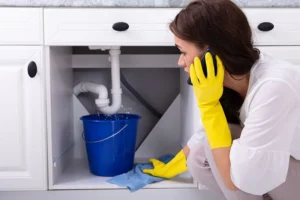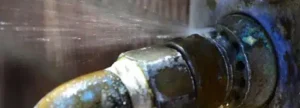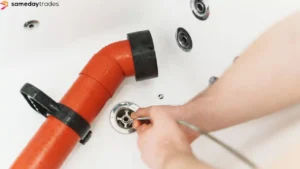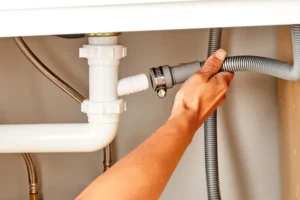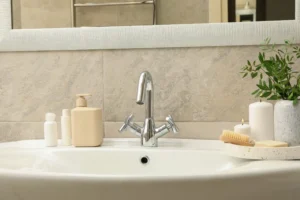Are you dealing with a plumbing problem and not sure who to call? Different types of plumbers specialise in various services, from fixing leaky taps to installing gas lines. This article will explain the various types of plumbers and help you choose the right one for your needs.
Read on!
Types of Plumbers
Plumbers play different roles based on their skills and training. Some plumbers work with house pipes, while others handle big buildings.
Residential plumbers
Residential plumbers work in homes. They fix and install pipes, water heaters, baths, and toilets. These plumbers ensure that everything works smoothly.
They handle emergencies like burst pipes or blocked internal drains. Residential plumbing services can also include maintenance to keep household systems running well.
Commercial plumbers
Commercial plumbers focus on plumbing in big buildings. They handle systems in schools, hospitals, malls, and offices. Unlike residential plumbers who work on homes, commercial plumbers deal with more complex systems.
These professionals install large pipes for water and sewerage. They also repair leaks in these massive buildings. Their tasks often involve high-pressure water systems and industrial-sized boilers.
Commercial plumbers need to know safety rules and codes because they work in places where many people gather daily.
Service and repair plumbers
Service and repair plumbers fix problems in homes and shops. They handle leaking taps, broken pipes, and clogged drains. These plumbers also install new fixtures like sinks and toilets.
It’s their job to keep everything running smoothly.
They use tools like wrenches, plungers, and pipe cutters. Service plumbers work fast to make repairs quickly. You can call them any time you have a plumbing issue at home or at work.
They are always ready to help with emergencies too!
Water supply plumbers
Water supply plumbers install, repair, and maintain pipes that bring fresh water to homes and businesses. They make sure you have clean water for drinking, cooking, and bathing.
These plumbers work on many different projects. They fix leaking taps, broken pipes, or even large systems in big buildings. Water supply plumbers also connect homes to the main water line in the street.
Sanitary and drainage plumbers
Sanitary and drainage plumbers keep our homes clean and safe. They install and fix pipes that carry waste and sewage away from buildings. These pipes take used water to treatment plants or septic tanks to be cleaned.
They also ensure stormwater drains work well. This stops flooding during heavy rains. Sanitary plumbers maintain sewers, sinks, toilets, and other plumbing fixtures in houses or commercial spaces.
Next comes the construction plumbers…
Construction plumbers
Construction plumbers work on putting in new plumbing systems in buildings. They install pipes, water tanks and fixtures like sinks and toilets during the building phase. Their job is essential for ensuring that homes, offices or any new structures have proper water supply and drainage.
They read blueprints to understand where the pipes should go. Strong problem-solving skills are needed so they can fit pipes around obstacles. Construction plumbers often work with other tradespeople on site too.
It’s a busy role that requires physical strength and safety awareness due to the heavy lifting and tools involved.
Specialties in Plumbing
Plumbers have different areas they work in. Some focus on fixing leaks, while others might install new systems.
Water supply
Water supply plumbers focus on installing and maintaining the pipes that bring clean water to homes and businesses. They ensure showers, sinks, washing machines, and other appliances get a steady flow of water.
These plumbers also fix any leaks or issues in the water pipes. They make sure drinking water is safe by testing for contaminants. Reliable water supply keeps everyone healthy and happy!
Sanitary and drainage
Sanitary and drainage plumbers handle waste removal systems. They make sure toilets, sinks, and drains work well. Issues like clogs or blockages fall under their job.
These plumbers also install sewers and septic tanks. They ensure clean water isn’t mixed with sewage. This keeps homes safe from harmful bacteria.
Emergency plumbing
Sanitary and drainage problems can be messy. Sometimes, things go wrong in the middle of the night. Emergency plumbing helps fix urgent issues like burst copper pipes or blocked toilets. These plumbers are available 24/7 and arrive quickly.
Emergency plumbers carry special tools for fast fixes. They handle problems like gas leaks, no hot water, and severe clogs. Their work stops damage before it gets worse. You can trust them to make your home safe again without delay.
Hot water systems
Hot water systems are crucial for homes and businesses. These systems heat water for baths, showers, dishwashing, and laundry. Plumbers install, repair, and maintain these systems to ensure a constant supply of hot water.
Gasfitters often handle gas-powered water heaters while others might work with electric or solar models. Each system has its pros and cons—gas heaters are quick but need proper ventilation; electric ones are safer but use more energy.
Gasfitting
Gasfitters work with gas pipes and systems. They install, repair, and maintain these pipes to ensure safety. Gasfitters handle everything from gas stoves to heaters and barbecues.
Safety is a big part of the job. Gas leaks can be dangerous, so gasfitters must be careful. They also check that all appliances meet safety standards before use. In Australia, you need special training and licenses to become a gasfitter.
How to Become a Plumber in Australia
To become a plumber in Australia, you need to complete some training. You also have to pass certain exams and obtain licenses.
Requirements for registration
Every plumber needs to get registered before starting work. First, you must complete an apprenticeship or equivalent training. This usually takes about four years of work and study.
Next, submit proof of your completed training to the local licensing body. Pass a skills assessment test that covers all basic plumbing tasks. Pay the required registration fee and provide identity documents like your ID and address proof.
Follow these steps to ensure you’re legally allowed to offer plumbing services in Australia!
Steps to obtain a registered plumber license
First, complete an apprenticeship under a licensed plumber. This usually takes four years. During this time, learn various plumbing skills like pipefitting and gas plumbing services.
Next, finish the required formal training courses. These courses cover subjects such as water supply systems and drainage systems. Once done with both the apprenticeship and formal training, apply for your license through your local state authority in Australia.
Pass all necessary exams to prove your knowledge and skills in residential plumbing and commercial plumbing tasks before receiving registration.
Steps to obtain a licensed plumber license
Completing the registration as a plumber is just one step. To obtain a licensed plumber license, you need further training. Enrol in advanced plumbing courses that focus on specific skills and safety.
These courses often last for about two years.
Licensed plumbers must pass exams set by the local authority or state. The exams test both practical skills and theoretical knowledge. After passing these exams, you can apply for your official plumber’s license.
This allows you to work independently or start your own plumbing business!
Choosing the Right Plumber
Make sure to pick a plumber who knows their trade well. Check their licenses and ask friends for recommendations.
Consider their specialties
Different plumbers have different skills. Some focus on fixing pipes in homes, known as residential plumbing specialists. Others, like commercial plumbers, work with big buildings and offices.
Water supply technicians handle clean water lines. Sanitary plumbers fix drains and sewers. Emergency plumbers are ready to help any time there’s a sudden problem like a burst pipe.
Gasfitters install or repair gas lines for stoves and heaters.
Check for proper licenses and registration
Specialties in plumbing matter, but so do licenses and registrations. A licensed plumber has passed tests and meets the rules. This proves they know their job well.
Check if your plumber is registered. In Australia, plumbers must have a license to work legally. This ensures safety and good quality work… always ask to see their license before hiring them!
Read reviews and ask for referrals
Read reviews online about plumbers. Check websites like Google and Yelp for customer feedback. Reviews can tell you if a plumber does good work or not. Look for lots of stars and positive comments.
Ask friends, family, or neighbours to refer a reliable plumber. They might know someone who did great work at their home or office. A trusted person’s referral is valuable because they’ve experienced the service firsthand.
Discuss pricing and services beforehand
Talking to your plumber about pricing and services is very important. It helps avoid surprises later on. Ask for a detailed quote, including all costs—labour, parts, and any extra fees.
Make sure you know what services are included. Are they doing just the repair or will they also clean up afterward? Always get everything in writing to protect yourself if things go wrong.
Good plumbers will be clear and upfront about their rates. This keeps everyone on the same page from start to finish.
Communication and reliability
Plumbers must be clear and prompt with their communication. They should explain the issue, steps to fix it, and any costs involved. This keeps everyone on the same page.
Reliability is crucial. A good plumber arrives on time and completes work as promised. Clients need to trust that they will get quality service every time.
Conclusion
Ready to learn about different plumbers? Some fix pipes at homes—residential plumbers. Others handle big buildings—commercial plumbers. Service and repair plumbers fix leaks and broken pipes.

